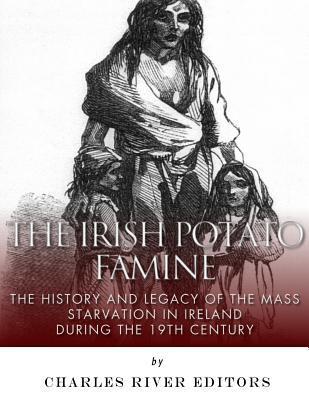The Irish Potato Famine: The History and Legacy of the Mass Starvation in Ireland During the 19th Century

The Irish Potato Famine: The History and Legacy of the Mass Starvation in Ireland During the 19th Century
*Includes accounts of the Famine written by survivors and newspapers
*Includes a bibliography for further reading
"I have called it an artificial famine: that is to say, it was a famine which desolated a rich and fertile island that produced every year abundance and superabundance to sustain all her people and many more. The English, indeed, call the famine a 'dispensation of Providence;' and ascribe it entirely to the blight on potatoes. But potatoes failed in like manner all over Europe; yet there was no famine save in Ireland." - John Mitchel, Young Ireland Movement Anyone who has ever heard of "the luck of the Irish" knows that it is not something to wish on someone, for few people in the British Isles have ever suffered as the Irish have. As one commissioner looking into the situation in Ireland wrote in February 1845, "It would be impossible adequately to describe the privations which they habitually and silently endure...in many districts their only food is the potato, their only beverage water...their cabins are seldom a protection against the weather...a bed or a blanket is a rare luxury...and nearly in all their pig and a manure heap constitute their only property." Even his fellow commissioners agreed and expressed "our strong sense of the patient endurance which the laboring classes have exhibited under sufferings greater, we believe, than the people of any other country in Europe have to sustain." Still, in their long history of suffering, nothing was ever so terrible as what the Irish endured during the Great Potato Famine that struck the country in the 1840s and produced massive upheaval for several years. While countless numbers of Irish starved, the famine also compelled many to leave, and all the while, the British were exporting enough food from Ireland on a daily basis to prevent the starvation. Over the course of 10 years, the population of Ireland decreased by about 1.5 million people, and taken together, these facts have led to charges as severe as genocide. At the least, it indicated a British desire to remake Ireland in a new mold. As historian Christine Kinealy noted, "As the Famine progressed, it became apparent that the government was using its information not merely to help it formulate its relief policies, but also as an opportunity to facilitate various long-desired changes within Ireland. These included population control and the consolidation of property through various means, including emi
PRP: 63.09 Lei
Acesta este Prețul Recomandat de Producător. Prețul de vânzare al produsului este afișat mai jos.
56.78Lei
56.78Lei
63.09 LeiIndisponibil
Descrierea produsului
*Includes accounts of the Famine written by survivors and newspapers
*Includes a bibliography for further reading
"I have called it an artificial famine: that is to say, it was a famine which desolated a rich and fertile island that produced every year abundance and superabundance to sustain all her people and many more. The English, indeed, call the famine a 'dispensation of Providence;' and ascribe it entirely to the blight on potatoes. But potatoes failed in like manner all over Europe; yet there was no famine save in Ireland." - John Mitchel, Young Ireland Movement Anyone who has ever heard of "the luck of the Irish" knows that it is not something to wish on someone, for few people in the British Isles have ever suffered as the Irish have. As one commissioner looking into the situation in Ireland wrote in February 1845, "It would be impossible adequately to describe the privations which they habitually and silently endure...in many districts their only food is the potato, their only beverage water...their cabins are seldom a protection against the weather...a bed or a blanket is a rare luxury...and nearly in all their pig and a manure heap constitute their only property." Even his fellow commissioners agreed and expressed "our strong sense of the patient endurance which the laboring classes have exhibited under sufferings greater, we believe, than the people of any other country in Europe have to sustain." Still, in their long history of suffering, nothing was ever so terrible as what the Irish endured during the Great Potato Famine that struck the country in the 1840s and produced massive upheaval for several years. While countless numbers of Irish starved, the famine also compelled many to leave, and all the while, the British were exporting enough food from Ireland on a daily basis to prevent the starvation. Over the course of 10 years, the population of Ireland decreased by about 1.5 million people, and taken together, these facts have led to charges as severe as genocide. At the least, it indicated a British desire to remake Ireland in a new mold. As historian Christine Kinealy noted, "As the Famine progressed, it became apparent that the government was using its information not merely to help it formulate its relief policies, but also as an opportunity to facilitate various long-desired changes within Ireland. These included population control and the consolidation of property through various means, including emi
Detaliile produsului











